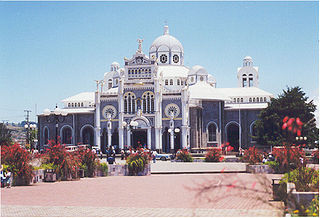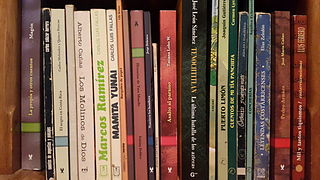Related Research Articles

Óscar Arias Sánchez is a Costa Rican activist and Nobel Peace Prize laureate. He was President of Costa Rica from 1986 to 1990 and from 2006 to 2010.

Cartago is the head city of Cartago canton of the Cartago Province,and is composed of the Oriental and Occidental districts as stated in the administrative divisions of Costa Rica. It was the capital of Costa Rica from 1574 to 1824.

Club Sport Cartaginés Deportiva S.A.,also known as Cartaginés,is a Costa Rican football club,that currently plays in the Liga de Fútbol de Primera División,the top division of Costa Rican football league system. Cartaginés' home venue is Estadio Jose Rafael Fello Meza,located in Barrio Asis of Cartago.

The Legislative Assembly forms the unicameral legislative branch of the Costa Rican government. The national congress building is located in the capital city,San José,specifically in Carmen district of the San Josécanton.

Lesbian,gay,bisexual,and transgender (LGBT) rights in Costa Rica have evolved significantly in the past decades. Same-sex sexual relations have been legal since 1971. In January 2018,the Inter-American Court of Human Rights made mandatory the approbation of same-sex marriage,adoption for same-sex couples and the removal of people's sex from all Costa Rican ID cards issued since October 2018. The Costa Rican Government announced that it would apply the rulings in the following months. In August 2018,the Costa Rican Supreme Court ruled against the country's same-sex marriage ban,and gave the Legislative Assembly 18 months to reform the law accordingly,otherwise the ban would be abolished automatically. Same-sex marriage became legal on 26 May 2020.
Same-sex marriage has been legal in Costa Rica since May 26,2020 as a result of a ruling by the Supreme Court of Justice. Costa Rica was the first country in Central America to recognize and perform same-sex marriages,the third in North America after Canada and the United States,and the 28th to do so worldwide.

Ezequiel Gutiérrez Iglesias was a Costa Rican politician.

The Supreme Court of Costa Rica is the court of greater hierarchy of Law and Justice in Costa Rica.
Luis Paulino Mora Mora was a Costa Rican judge. He was the President of the Supreme Court of Costa Rica from July 12,1999 until his death in 2013.
The history of the Jews in Costa Rica dates back to the Spanish conquest with the arrival of many Sephardic converts known as Marranos who escaped from the Spanish Inquisition and settled mainly in the city of Cartago and its surroundings. They hid their Jewish past by all means,making even their descendants have no idea of it.

Costa Rican literature has roots in colonization and is marked by European influences. Because Costa Rica is a young country,its literary tradition is also young. The history of Costa Rican literature dates to the end of the 19th century.

Orión F.C. is a Costa Rican football club,based in Desamparados. It was founded in 1926 and has most recently played in Costa Rica's First Division in 2012. They were crowned national league champions twice.
Events in the year 2014 in Costa Rica.

General elections were held in Costa Rica on Sunday,2 February 2014 to elect a new president,two vice presidents,and 57 Legislative Assembly lawmakers. In accordance with Article 132 of the constitution,incumbent President Laura Chinchilla Miranda was ineligible to run for a second consecutive term.

The Constitution of Costa Rica is the supreme law of Costa Rica. At the end of the 1948 Costa Rican Civil War,JoséFigueres Ferrer oversaw the Costa Rican Constitutional Assembly,which drafted the document. It was approved on 1949 November 7. Several older constitutions had been in effect starting from 1812,with the most recent former constitution ratified in 1871. The Costa Rican Constitution is remarkable in that in its Article 12 abolished the Costa Rican military,making it the second nation after Japan to do so by law. Another unusual clause is an amendment asserting the right to live in a healthy natural environment.
Doris Yankelewitz Berger was a Costa Rican artist,politician,political activist,and member of the National Liberation Party (PLN). She served as the First Lady of Costa Rica from 1982 to 1986 during the presidency of her then-husband,President Luis Alberto Monge. She was the nation's first Jewish First Lady.

General elections were held in Costa Rica in 2018 to elect both the President and Legislative Assembly. The first round of the presidential election was held on 4 February 2018,with the two highest-ranked candidates being Christian singer and Congressman Fabricio Alvarado Muñoz from the conservative National Restoration Party and writer and former Minister Carlos Alvarado Quesada from the progressive Citizens' Action Party,gaining 24% and 21% of the votes respectively. As no candidate received more than 40% of the first round vote,a second round run-off election was held on 1 April 2018 and was won by Carlos Alvarado Quesada,with a landslide victory of 60.6% of the vote.

The Reform State or Reformist State is the period in 20th-century Costa Rican history when the country switched from the uncontrolled capitalism and laissez-faire approach of the Liberal State into a more economically progressive Welfare State. It began about 1940 during the presidency of social reformer Rafael Angel Calderón Guardia,and ended in the 1980s with the neoliberal reforms inherent in the Washington Consensus that began after the government of Luis Alberto Monge.

General elections were held in Costa Rica on 6 February 2022,to elect the president,two vice-presidents,and all 57 deputies of the Legislative Assembly. As none of the presidential nominees obtained at least 40% of the votes,a runoff was held on 3 April 2022,between the top two candidates,JoséMaría Figueres and Rodrigo Chaves Robles.
References
- ↑ Villanueva Monge, Zarela. "Curriculum Vitae Zarela Villanueva" (PDF). Judicial Court. Retrieved 30 May 2016.
- ↑ "Villanueva rompe con 187 años de historia judicial en la Corte". La Nación (San José) . 14 May 2013.
- ↑ "Nombran por otro período a magistrada Zarela Villanueva". NEXOS Costa Rica. Retrieved 30 May 2016.
- ↑ Villanueva Monge, Zarela. "Los Derechos Humanos y la Justicia de Género: Perspectivas Regionales" (PDF). Judicial Court Web. Judicial Court. Retrieved 30 May 2016.
- ↑ "Zarela Villanueva". www.revistaperfil.com. Retrieved 30 May 2016.
- ↑ www.altas-buscadores.com. "Pensamiento juridico feminista". www.pensamientojuridicofeminista.com. Retrieved 30 May 2016.
- ↑ "Corte nombra a nuevo Presidente ante salida de Zarela Villanueva". La Prensa Libre (Costa Rica).
- ↑ Cantero, Marcela (5 June 2007). "Develan tres rostros en Galería de la Mujer". La Nación (San José) (in Spanish). Retrieved 15 July 2016.